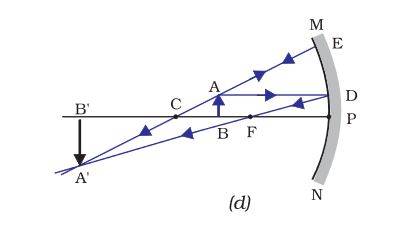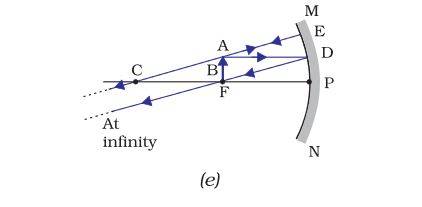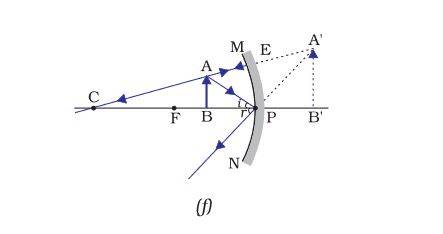Concave and Convex mirrors
Plane Mirrors
This type of a mirror is a plane reflecting surface. The size of the image formed is almost equal to the size of the object.
Spherical Mirrors
These mirrors have curved surfaces. The spherical mirrors are of two types:
- Convex Mirrors
- Concave Mirrors
(Image source: https://ncert.nic.in/ncerts/l/jesc110.pdf)
The concave mirror is a spherical mirror whose reflecting surface is curved inwards (faces the centre of the sphere). On the other hand, a convex mirror has an outward-reflecting surface.
Image formation by Spherical Mirrors
The following ray diagrams show the various image formations for both the spherical mirrors.
Concave
1.
| Object Position |
Image Position |
Image Size |
Image Nature |
|---|---|---|---|
| At infinity |
At the focus F |
Highly diminished, point size |
Real and inverted |
(Image source: https://ncert.nic.in/ncerts/l/jesc110.pdf)
2.
| Object Position |
Image Position |
Image Size |
Image Nature |
|---|---|---|---|
| Beyond C |
Between F and C |
Diminished |
Real and inverted |
(Image source: https://ncert.nic.in/ncerts/l/jesc110.pdf)
3.
| Object Position |
Image Position |
Image Size |
Image Nature |
|---|---|---|---|
| At C |
At C |
Same size |
Real and inverted |
(Image source: https://ncert.nic.in/ncerts/l/jesc110.pdf)
4.
| Object Position | Image Position | Image Size | Image Nature |
| Between C and F |
Beyond C |
Enlarged |
Real and inverted |
(Image source: https://ncert.nic.in/ncerts/l/jesc110.pdf)
5.
| Object Position | Image Position | Image Size | Image Nature |
| At F |
At infinity |
Highly enlarged |
Real and inverted |
(Image source: https://ncert.nic.in/ncerts/l/jesc110.pdf)
6.
| Object Position | Image Position | Image Size | Image Nature |
| Between P and F |
Behind the mirror |
Enlarged |
Virtual and erect |
(Image source:https://ncert.nic.in/ncerts/l/jesc110.pdf)
Convex
| Object Position |
Image Position |
Image Size |
Image Nature |
|---|---|---|---|
| At infinity |
At F, behind the mirror. |
Highly diminished, point size |
Virtual and erect |
(Image source: https://ncert.nic.in/ncerts/l/jesc110.pdf)
2.
| Object Position |
Image Position |
Image Size |
Image Nature |
|---|---|---|---|
| Between infinity and P |
Between P and F, behind the mirror. |
Diminished. |
Virtual and erect |
(Image source: https://ncert.nic.in/ncerts/l/jesc110.pdf)
‘Convex and Concave Mirrors’ is a topic from the chapter ‘ Light- Reflection and Refraction’, taught in Class X Science (NCERT). 4 questions for 8 marks are asked in the exam from this chapter.
Illustrative Examples
Example 1: A convex mirror has a radius of curvature of 6.00m. If a tree is at 10.00m from this convex mirror, find the nature, position, and size of the image of the tree.
Solution: Radius of curvature, R=+6.00m;
Object-distance, u=–10.00m;
Image-distance, v=?
Height of the image, h′=?
Focal length, f=R/2=+6.00m/2=+3.00m
Since 1/u+1/v=1/f,
Thus, v=uf/(f-u)=30/13=+2.31 m
And, m=h'/h=-v/u=2.31/10.00=0.23.
Therefore, the image is virtual, erect, and smaller in size by a factor of 0.23.
Example 2: Given h=4cm, u=-25cm, f=-15cm. Find v and h'?
Solution: Since 1/u+1/v=1/f,
1/v=1/25-1/15
v=-37.5cm
m=h'/h=-v/u
h'=-vh/u.
h'=-6cm.
Example 3: h=4cm, h’=16cm, u=-10cm, v=?
Solution: h'/h=-v/u
16/4=v/10
v=40cm.
FAQs
Q: What is reflection?
A: The phenomenon of light when it bounces off shiny and polished surfaces is called reflection.
Q: What are the types of mirrors?
A: Plane mirrors and spherical mirrors.
Q: What are the types of spherical mirrors?
A: Concave and convex.
Q: Define Concave and Convex mirrors.
A: The concave mirror is a spherical mirror whose reflecting surface is curved inwards. The reflecting surface of the convex mirror is curved outwards.
Q: What is the mirror formula?
A: 1/u+1/v=1/f; where u=object distance, v=image distance, f=focal length.
News & Updates
Physics Optics Exam
Student Forum
Popular Courses After 12th
Exams: BHU UET | KUK Entrance Exam | JMI Entrance Exam
Bachelor of Design in Animation (BDes)
Exams: UCEED | NIFT Entrance Exam | NID Entrance Exam
BA LLB (Bachelor of Arts + Bachelor of Laws)
Exams: CLAT | AILET | LSAT India
Bachelor of Journalism & Mass Communication (BJMC)
Exams: LUACMAT | SRMHCAT | GD Goenka Test








